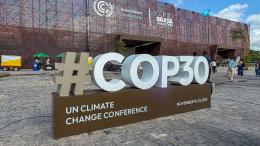This session will be part of the Resilience Hub at the 2023 UN Climate Change Conference (UNFCCC COP28) to be held on 30 November–12 December 2023 in Dubai, UAE.
The event will focus on practical measures for ecosystem-based disaster risk reduction, aiming to empower communities to 'bounce forward' instead of bouncing back. Blending disaster risk finance, climate decision tools and real-world examples, the session will explores innovative case studies, from finance mechanisms to grassroots nature-based solutions, emphasizing the vital role of ecosystem restoration for sustainable socio-ecological resilience.
Ecosystems, crucial buffers against hazards, prevent and reduce disaster impacts on people, infrastructure and services. The conservation, restoration and sustainable management of land, wetlands, oceans and natural resources enhance climate risk management. Vulnerable populations globally depend on ecosystems for their livelihoods and resilience, emphasizing the interdependency between human well-being, ecosystems, and evolving risk patterns.
This event will include an interactive 'fishbowl' session, in which participants will share resilience challenges, propose solutions and discuss the way forward.
Participation
For in-person participation, the Resilience Hub (Blue Zone) is accessible to all COP28 participants.
Online participation is open to the public. Please register in advance on the Resilience Hub virtual platform. Further details about online participation will be added to this page when available.
Please note that participants in UNU events may appear in photography, screen captures, videos, and/or audio (see disclaimer).
Language
This event will be held in English.
Programme
| Time | Agenda | Speaker |
| 15:00 | Welcome Remarks |
Shinobu Yume Yamaguchi (Director, UNU-IAS) |
| 15:02 | Introduction |
Savina Carluccio (Executive Director, ICSI) |
| 15:06 | Speaker 1 |
Tristan Tyrrell (Programme Officer, Biodiversity and Climate Change, SCBD) |
| 15:09 | Speaker 2 |
Jennifer Corpuz (Representative of the International Indigenous Forum on Biodiversity (IIFB)) |
| 15:12 | Speaker 3 |
Moustafa Mahmoud (Sustainability Director, AtkinsRéalis) |
| 15:15 | Speaker 4 |
Basundhara Bhattara (Director/Senior Expert on Gender Equality, Disability, and Social Inclusion, Institute for Study and Development Worldwide (IFSD), Australia) |
| 15:18 | Speaker 5 |
Anusha Shah (President, Institution of Civil Engineers (ICE)) |
| 15:20 | Speaker 6 |
Youssef Nassaf (Director, Adaptation Division, UNFCCC) (TBC) |
| 15:22 | Fishbowl Session |
Moderators: Nidhi Nagabhatla (Senior Research Fellow and Cluster Coordinator, UNU-CRIS) Sanae Okamoto (Researcher, UNU-MERIT) Savina Carluccio (Executive Director, ICSI) Suneetha Subramanian (Research Fellow, UNU-IAS) |
| 15:50 | Summary of the Discussions and Potential Ways Forward |
Suneetha Subramanian (Research Fellow, UNU-IAS) |
| 15:55 | Art Engagement Performance (Music) | |
| 16:00 | Closing |
Organizers
This session will be co-organized by UNU-IAS, UNU-CRIS, UNU-MERIT, and the International Coalition for Sustainable Infrastructure (ICSI).






